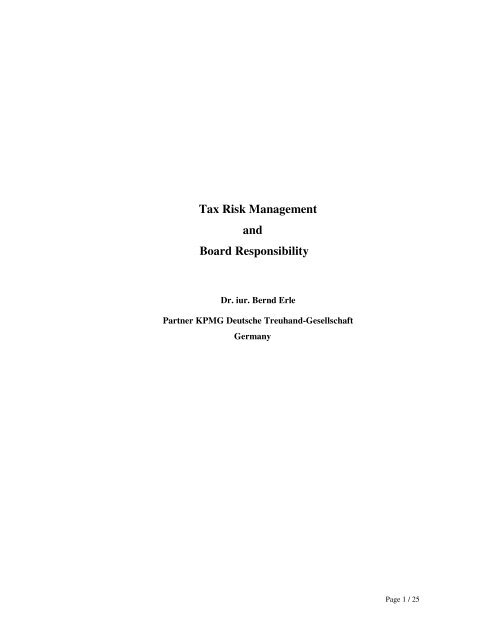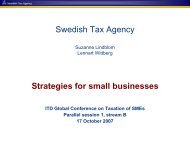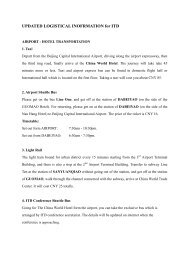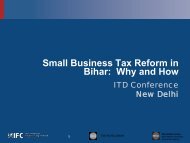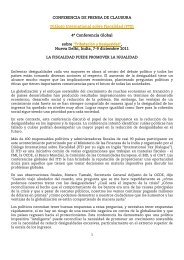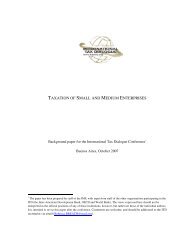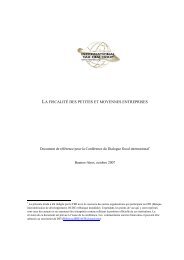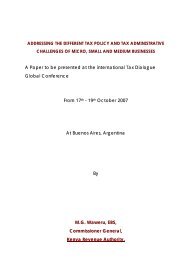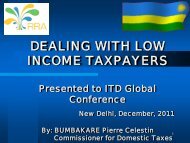Tax Risk Management and Board Responsibility - International Tax ...
Tax Risk Management and Board Responsibility - International Tax ...
Tax Risk Management and Board Responsibility - International Tax ...
You also want an ePaper? Increase the reach of your titles
YUMPU automatically turns print PDFs into web optimized ePapers that Google loves.
<strong>Tax</strong> <strong>Risk</strong> <strong>Management</strong><br />
<strong>and</strong><br />
<strong>Board</strong> <strong>Responsibility</strong><br />
Dr. iur. Bernd Erle<br />
Partner KPMG Deutsche Treuh<strong>and</strong>-Gesellschaft<br />
Germany<br />
Page 1 / 25
Contents<br />
I. Introduction ............................................................................................................3<br />
II.<br />
The changing L<strong>and</strong>scape – Why has tax risk management become increasingly<br />
important? ..........................................................................................................5<br />
1 <strong>Tax</strong> is in the news ...............................................................................................5<br />
2 Relevance of tax for business performance <strong>and</strong> financial statements ...................6<br />
3 Compliance <strong>and</strong> reporting an ongoing challenge .................................................7<br />
III. <strong>Tax</strong> is in the boardroom – What is the perspective of the board? .........................9<br />
1 Awareness ..........................................................................................................9<br />
2 <strong>Tax</strong> risk attitudes versus actual behaviour ......................................................... 10<br />
3 Managing tax risks – what is the challenge for the board? ................................. 11<br />
IV. <strong>Tax</strong> <strong>Risk</strong> <strong>Management</strong> in practice ..................................................................... 12<br />
1 Defining a tax philosophy <strong>and</strong> setting a framework ........................................... 12<br />
2 Components of the tax risk management framework ......................................... 13<br />
V. <strong>Board</strong> responsibility .......................................................................................... 17<br />
1 <strong>International</strong> focus on board responsibility for tax risk management ................ 17<br />
2 Decisions to make <strong>and</strong> questions to ask ............................................................ 18<br />
VI. Future developments ........................................................................................ 23<br />
VII. Conclusion ....................................................................................................... 25<br />
Page 2 / 25
I. Introduction<br />
Is the board responsible for tax? This question might have caused interesting discussions<br />
among board members a few years ago. Statements such as “It’s a CFO issue”<br />
<strong>and</strong> “tax is under control” might quite possibly have been among the responses. <strong>Tax</strong>ation<br />
gives rise to complex, multi-faceted problems in every country in the world, that can only<br />
be dealt with by tax specialists. This argument used to be met with some sympathy,<br />
especially by members of the public who were familiar with the complexities of filing their<br />
own income tax returns every year. But the question remained: how can an issue that might<br />
encourage a corporate reorganisation or influence the payment of dividends to<br />
shareholders, or which might affect a merger or take-over, possibly stay out of the board<br />
room?<br />
Particularly in the wake of corporate sc<strong>and</strong>als like Enron <strong>and</strong> WorldCom, or the<br />
collapse of the new economy in Germany it has become clear that there is a need for the<br />
board to set up a transparent governance system throughout its company. Legislative<br />
requirements as regards internal control systems have increased significantly, as well as<br />
other initiatives from governmental <strong>and</strong> non-governmental bodies.<br />
Stakeholders are showing increasing interest in obtaining comprehensive information on<br />
how tax risk management <strong>and</strong> corporate conduct are implemented <strong>and</strong> supervised.<br />
Financial key performance indicators used to be the most important measures for the<br />
performance of companies <strong>and</strong> therefore “the lower the tax charge the better” was the<br />
simple rule. Now concepts of sustainability <strong>and</strong> the management of long-term value added<br />
are assuming increased importance. The value of tax avoidance strategies is increasingly in<br />
doubt especially when taking the potential damage to reputation into account. Stakeholders<br />
dem<strong>and</strong> sufficient long-term information on how tax risks are being controlled, the tax risk<br />
management system is implemented <strong>and</strong> the corporate conduct is supervised.<br />
In theory there is no doubt that tax risk management is part of the corporate governance<br />
system <strong>and</strong> therefore it is the responsibility of the whole board.<br />
From every theory arise a number of practical questions. Are the board members aware<br />
of their responsibility for tax risk management? What impact does tax risk management<br />
Page 3 / 25
have on corporate structures, processes <strong>and</strong> transactions? <strong>Tax</strong> issues are complex, multifaceted<br />
<strong>and</strong> subject to ongoing change. What qualifications do the board need to actually<br />
underst<strong>and</strong> <strong>and</strong> govern tax risks? What exactly does the board need to do to implement a<br />
tax risk management system? What communication <strong>and</strong> documentation requirements need<br />
to be fulfilled? What kind of future developments need to be considered?<br />
This paper will address most of the issues raised, mainly from a practitioner’s point of<br />
view. The study starts with a short look at the developments that have given rise to the<br />
increasing importance of tax risk management for the board. Following this analysis the<br />
key results of a recent KPMG survey of the views of board members on tax risk<br />
management are outlined. The third part will show the challenges of tax risk management<br />
<strong>and</strong> introduce practical solutions. In chapter four the paper focuses on the responsibilities<br />
of the board for managing tax risks.<br />
Where do we go from here? The final chapter considers what the future might look like<br />
with regard to tax risk management <strong>and</strong> the board’s role in this area.<br />
Page 4 / 25
II. The changing L<strong>and</strong>scape – Why has tax risk management become<br />
increasingly important?<br />
1 <strong>Tax</strong> is in the news<br />
“Non-compliance a growing problem” 1 , “<strong>Tax</strong>: Multinationals’ low bill in poor nations<br />
under fire” 2 , “Managers under pressure to give tax its due – as rules <strong>and</strong> sc<strong>and</strong>als<br />
proliferate, the issue of how to manage tax has become far more urgent” 3 , “Cut tax or lose<br />
business” 4 , “HSBC says tax regime may force it to move” 5 , “IFRS brings tax out of the<br />
back room – TAXING MATTERS – a company’s tax policy, traditionally a mere technical<br />
issue, is increasingly viewed as a strategic matter” 6 .<br />
Major business headlines deal with non-compliance of companies, tax as a significant<br />
cost factor for business <strong>and</strong> increasing regulation on the disclosure of tax information.<br />
Primary goal for the board is to achieve excellent financial results. <strong>Tax</strong> is a significant<br />
cost factor for companies. That implies that minimizing tax will increase profitability. But<br />
besides the obvious tax payments there are other costs that are harder to measure but that<br />
need to be taken into account.<br />
There is a strong interrelation between the success of a business <strong>and</strong> its reputation<br />
which significantly depends on the general perception of the company. The public interest<br />
in corporate social responsibility of businesses (CSR) is growing. Paying the taxes legally<br />
required in any country where the company operates is considered an important part of<br />
being socially responsible. CSR is no longer the concern only of non-government<br />
organisations. It has been raised to the agenda of international organisations like the United<br />
1 Financial Times, October 13, 2006<br />
2 The Guardian, September 18, 2006<br />
3 Financial Times, August 19, 2005<br />
4 The Times, October 10, 2006<br />
5 Financial Times, October 6, 2006<br />
6 Financial Times, July 4, 2005<br />
Page 5 / 25
Nations <strong>and</strong> the Organisation for Economic Co-operation <strong>and</strong> Development (OECD).<br />
“Business practices rooted in universal values can bring social <strong>and</strong> economical gain” 7 .<br />
Stakeholders are enquiring more into the values that underlie a business’s actions.<br />
Companies that move to tax shelters without obvious business reasons risk reputational<br />
damage in addition to the possibility of legal actions. In 2004 Swatch, the Swiss<br />
watchmaker, featured in the newspapers over its transfer pricing arrangements, while US<br />
clothing group Tommy Hilfiger could find itself in court over the commissions paid to a<br />
non-US subsidiary. 8<br />
Stakeholders’ dem<strong>and</strong> for ethical behaviour is increasing significantly <strong>and</strong> tax is one<br />
area where businesses have to show value-based behaviour. Socially responsible investors<br />
have been active in the US at companies such as Pepsi <strong>and</strong> Raytheon, <strong>and</strong> have dem<strong>and</strong>ed<br />
curbs on tax havens used by Tyco <strong>and</strong> others 9 . In the UK Henderson Global Investors<br />
encourages all companies to consider whether tax matters are among the principal risks<br />
<strong>and</strong> uncertainties facing the company, or are included in the main trends <strong>and</strong> factors which<br />
are likely to affect the company’s future development, performance <strong>and</strong> position 10 .<br />
<strong>Tax</strong> has become an ethical <strong>and</strong> reputational issue <strong>and</strong> the board is responsible to ensure<br />
awareness of tax issues throughout the organisation.<br />
2 Relevance of tax for business performance <strong>and</strong> financial statements<br />
Certainly the board is primarily accountable for the financial performance of a business.<br />
And it should not be forgotten that, as Josef Ackermann stated, financial success is<br />
important because the more a company earns the more taxes it is able to pay 11 .<br />
<strong>Tax</strong>es are important figures on the face of the balance sheet <strong>and</strong> the income statement of a<br />
company. They have strong implications for the year end results as well as the profitability<br />
<strong>and</strong> the ability to pay dividends. <strong>Tax</strong> considerations can influence the decisions on major<br />
7 Ban Ki-Moon, Secretary General of the United Nations.<br />
8 Ethical Company, December 2004, page 25<br />
9 Ethical Company, December 2004, page 25<br />
10 Henderson Global Investors, “Responsible <strong>Tax</strong>”, October 2005<br />
11 “Wir wollen Deutschl<strong>and</strong> nicht verlassen”Süddeutsche Zeitung, 10 march 2007, page 25;<br />
Page 6 / 25
usiness transactions such as mergers, acquisitions <strong>and</strong> disposals of companies. Thus if<br />
something goes wrong this does not only affect the balance sheet but may also affect the<br />
share price significantly. In February 2006 Google announced reduced earnings due to a<br />
higher than expected tax charge. Market value fell by 20 billion dollars.<br />
An analysis of companies listed on the Dax-30 Index in Germany shows that the deferred<br />
tax assets can easily amount to forty percent of the equity of a business. This means that if<br />
the tax asset is impaired almost half of the equity may be wiped out.<br />
Due to the importance of tax effects on business performance <strong>and</strong> financial statements the<br />
board will be accountable for implementing processes that ensure the quality of tax figures<br />
reported. This implies specifically that tax provisions <strong>and</strong> liabilities must be calculated<br />
accurately <strong>and</strong> the correct valuation of deferred tax assets in the balance sheet must be<br />
ensured. The board must therefore bridge the gap between being profitable <strong>and</strong> not taking<br />
tax risks that could have negative impacts on the business performance <strong>and</strong> the financial<br />
statements. But tax in many cases has a long term perspective. So the implication go far<br />
beyond the financial statement of one year.<br />
3 Compliance <strong>and</strong> reporting an ongoing challenge<br />
The trend of globalisation has developed further as emerging markets offer new<br />
business opportunities. An international survey among 250 chief financial officers of<br />
successful global companies shows that the majority sees foreign expansion as one of their<br />
top priorities 12 . However, globalisation has become a ‘two-way street’ where emerging<br />
economies show increasing amounts of foreign direct investment. At the same time, there<br />
are significant flows of investment into emerging markets to take advantage of low costs<br />
<strong>and</strong> access to new markets 13 . Multinational companies now have to take into account<br />
different local regulations, customs <strong>and</strong> stakeholder expectations as well as market<br />
dem<strong>and</strong>s.<br />
In addition the complexity of tax laws at national <strong>and</strong> international level has increased<br />
significantly <strong>and</strong> is subject to ongoing changes. Furthermore, tax law often inter-relates<br />
12 ,Emerging Markets, KPMG 2007 January 2007, pg. 1<br />
13 World Investment report 2006 United Nations Conference on Trade <strong>and</strong> Development Oct. 2006<br />
www.unctad.org<br />
Page 7 / 25
with other legal issues. Uncertainties with regard to interpretations of legal regulations are<br />
also not uncommon. To ensure full compliance with all legal requirements has become a<br />
challenge for almost every corporate governance system. As the OECD Principles state:<br />
“Corporate governance requirements <strong>and</strong> practices are typically influenced by an array of<br />
legal domains, such as company law, securities regulations, accounting <strong>and</strong> auditing<br />
st<strong>and</strong>ards, insolvency law, contract law, labour law <strong>and</strong> tax law. Under these<br />
circumstances, there is a risk that the variety of legal influences might cause unintentional<br />
overlaps <strong>and</strong> even conflicts, which may frustrate the ability to pursue key corporate<br />
governance objectives.” 14<br />
Global markets <strong>and</strong> the free flow of capital made it possible to control the jurisdiction in<br />
which profits arise which is a challenge for tax authorities. As a result the enforcement<br />
processes through civil <strong>and</strong> criminal actions have been strengthened in many countries <strong>and</strong><br />
on an international level.<br />
Reporting <strong>and</strong> documentation requirements have been enhanced to address the problems<br />
of information asymmetries resulting from the principal-agent conflict - between<br />
shareholders <strong>and</strong> the management - <strong>and</strong> in the light of corporate sc<strong>and</strong>als like Enron <strong>and</strong><br />
WorldCom. Most notably the Sarbanes-Oxley Act (SOX) was introduced in the United<br />
States which required a significant effort from companies in documenting their internal<br />
control systems. The Financial Accounting St<strong>and</strong>ards <strong>Board</strong> (FASB) Interpretation No. 48<br />
(FIN 48) also intensifies the focus on accounting <strong>and</strong> disclosures for uncertainties in tax<br />
positions in the financial statements 15 .<br />
In the light of these developments tax cannot stay in the splendid isolation in which its<br />
technical nature has historically placed it. The management of tax risk has become even<br />
more important in the light of recent changes. The public, shareholders <strong>and</strong> legislators<br />
expect board members to address these effects through the corporate governance system of<br />
a business.<br />
14 OECD Principles (2004), I.C Annotations, page 31.<br />
15 FASB Interpretation No. 48, Accounting for Uncertainties in Income <strong>Tax</strong>es, an interpretation of FASB<br />
statement No. 109<br />
Page 8 / 25
III. <strong>Tax</strong> is in the boardroom – What is the perspective of the board?<br />
1 Awareness<br />
The OECD states: “What is clear is that the recent spate of corporate sc<strong>and</strong>als, the<br />
success of a number of tax administrations in challenging aggressive tax schemes <strong>and</strong> the<br />
general change in attitudes towards tax planning, will all combine to produce a greater<br />
awareness in the <strong>Board</strong>room of the importance of tax issues” 16<br />
KPMG has undertaken surveys <strong>and</strong> asked board members for their views on the<br />
relevance of tax issues for the board over recent years. The directors of many companies<br />
acknowledge the need to change their attitudes towards tax. There is a general<br />
underst<strong>and</strong>ing that tax cannot be managed independently from the main business <strong>and</strong> can<br />
have a significant influence on decisions as regards the transactions undertaken 17 .<br />
Survey results from 2006 show that 72 % of the respondents consider tax <strong>and</strong> its risks to<br />
be boardroom issues (an increase of 11% over a two year period). There is awareness that a<br />
reduction in taxes can increase the value of a company. They also consider that the most<br />
significant areas where tax has an impact are changes in capital structures, intra-group<br />
funding arrangements, transfer pricing <strong>and</strong> similar transactions. 18<br />
The issue has therefore become more important in recent years. But this does not mean<br />
that changes follow at the same speed. Various major critical issues remain. Many tax<br />
departments are isolated so that their presence is not felt throughout the business. There is<br />
a lack of general underst<strong>and</strong>ing <strong>and</strong> awareness of tax issues. <strong>Tax</strong> considerations are not<br />
integrated into the main business processes. <strong>Tax</strong> may be considered on central projects, but<br />
is often ignored in routine day-to-day transactions. The performance measures for<br />
management are mainly based on pre-tax figures such as earnings before interest <strong>and</strong> tax<br />
(EBIT).<br />
16 Good Corporate Governance: the <strong>Tax</strong> Dimension – OECD Forum on <strong>Tax</strong> Administration – September<br />
2006<br />
17 KPMG’s Wired <strong>Tax</strong> survey 2004<br />
18 KPMG’s Wired <strong>Tax</strong> survey 2004 <strong>and</strong> 2006<br />
Page 9 / 25
The results of the survey show that only 14 % of the companies included in the research<br />
had board-approved tax objectives. Regular formal reviews of the tax department by<br />
internal audit were carried out in only 22% of the companies. Only 10% of the tax<br />
departments felt that they were widely understood outside the tax function. 19<br />
The reasons for the contradiction between the awareness of the board <strong>and</strong> the lack of<br />
implementation are many. It is mainly caused by the increasing complexity of tax law as<br />
well as increasing reporting requirements that leave less time to consider strategic issues<br />
<strong>and</strong> debate the big picture. A lack of expert staff makes change even more difficult. Finally<br />
there is a lack of underst<strong>and</strong>ing on how the world’s tax authorities are changing their<br />
approaches.<br />
2 <strong>Tax</strong> risk attitudes versus actual behaviour<br />
When informally asked about their risk appetites the majority of the board members<br />
questioned would designate themselves ‘conservative’. Only very few would see<br />
themselves as ‘very conservative’, meaning that they would do nothing to provoke the tax<br />
authorities. The majority require a legal opinion comfort of more than 50% on their tax<br />
planning. Companies are mainly willing to defend their tax planning in court, but none of<br />
the board members questioned think a reputational risk is acceptable. The research<br />
suggests also that attitudes have shifted towards the risk-averse end of the spectrum. 20<br />
Surprisingly there is a gap between tax risk attitudes <strong>and</strong> actual behaviour as the results<br />
of legal proceedings from tax authorities often show. Since that is the case the board<br />
members are facing significant problems due to the fact that the company’s behaviour does<br />
not reflect their attitudes <strong>and</strong> might trigger inquiries by tax authorities.<br />
<strong>Tax</strong> authorities have shifted to a risk-oriented approach to identify non-compliant<br />
taxpayers <strong>and</strong> look especially at questions like: Is a clear direction from the board given as<br />
regards tax matters? Does the audit committee request information on tax issues <strong>and</strong> is<br />
adequate supervision in place? Have there been compliance issues in the past? Is there<br />
19 KPMG’s Wired <strong>Tax</strong> survey 2004 <strong>and</strong> 2006<br />
20 KPMG’s Wired <strong>Tax</strong> survey 2004 <strong>and</strong> 2006<br />
Page 10 / 25
extraordinary pressure from investors to deliver results <strong>and</strong> are directors or management<br />
under pressure to achieve personal goals? 21<br />
A key challenge is to ensure that the risk attitude of the board is reflected in the<br />
company’s actual behaviour <strong>and</strong> in the mindset of everybody involved. There cannot be<br />
two policies: one for the board <strong>and</strong> one for the tax department.<br />
3 Managing tax risks – what is the challenge for the board?<br />
<strong>Tax</strong> risks include the risk of overpaying taxes or of paying less tax than legally required.<br />
Reputational damage resulting from such errors can incur additional costs which are hard<br />
to measure. Errors in assessing the tax effects of transactions can lead to wrong business<br />
decisions. For many businesses tax is a cost factor that can be important for its<br />
competitiveness. To summarise: tax risks mainly consist of compliance risks, transactional<br />
risks, <strong>and</strong> operational <strong>and</strong> reputational risks 22 . These are good reasons for the board to be<br />
involved in tax risk management.<br />
The goal for the board is to implement a tax risk management process that has the right<br />
balance between risk <strong>and</strong> opportunity. The business processes need to ensure that taxes are<br />
not overpaid but that legal obligations are fulfilled.<br />
Going forward, organizations will need a dual focus: (1) sustaining an ongoing<br />
assessment process for compliance <strong>and</strong> (2) balancing risk <strong>and</strong> controls while identifying<br />
<strong>and</strong> pursuing process improvement opportunities to better the business. 23<br />
The question of how to implement a tax risk management system that ensures this<br />
objective is met will be addressed in the following chapter.<br />
21 KPMG <strong>Tax</strong> is in the <strong>Board</strong>room, A Discussion Paper, 2004<br />
22 KPMG <strong>Tax</strong> in the <strong>Board</strong>room, A Discussion Paper, 2004, Appendix II<br />
23 KPMG The Compliance Journey Balancing <strong>Risk</strong> <strong>and</strong> Controls with Business Improvement, 2004<br />
Page 11 / 25
IV. <strong>Tax</strong> <strong>Risk</strong> <strong>Management</strong> in practice<br />
1 Defining a tax philosophy <strong>and</strong> setting a framework<br />
The board has to set the general st<strong>and</strong>ards for tax issues by defining a global tax<br />
philosophy <strong>and</strong> setting a framework for the governance of tax issues throughout the<br />
business. The tax philosophy on a practical level is the code of conduct for tax issues 24 . A<br />
code of conduct is intended to establish the ethical norms of the company <strong>and</strong> to set<br />
st<strong>and</strong>ards for ethical behaviour when dealing with those inside <strong>and</strong> outside the firm 25 . So<br />
the tax philosophy as code of conduct with regard to tax issues states the overall position of<br />
the company towards tax.<br />
The OECD Guidelines for Multinational Companies indicate what can be addressed: “It<br />
is important that enterprises contribute to the public finances of host countries by making<br />
timely payment of their tax liabilities. In particular, enterprises should comply with the tax<br />
laws <strong>and</strong> regulations in all countries in which they operate <strong>and</strong> should exert every effort to<br />
act in accordance with both the letter <strong>and</strong> spirit of those laws <strong>and</strong> regulations. This would<br />
include such measures as providing to the relevant authorities the information necessary<br />
for the correct determination of taxes to be assessed in connection with their operations <strong>and</strong><br />
conforming transfer pricing practices to the arm’s length principle.” 26<br />
The tax philosophy needs to be embedded in the overall goals of the business. As the<br />
code of conduct it must not only be a set of rules for good behaviour but must be part of<br />
company’s culture <strong>and</strong> become a factor in everyday business dealings 27 . Establishing a<br />
position requires the board to decide on the focus areas for tax management. Is tax mainly<br />
seen as a normal cost factor that needs to be minimized as a duty to shareholders or is its<br />
payment a social obligation <strong>and</strong> a duty to the local community. Most companies take a<br />
position closer to the idea that ‘tax is a cost factor’ <strong>and</strong> therefore a decision needs to be<br />
24<br />
25<br />
26<br />
27<br />
KPMG <strong>Tax</strong> in the <strong>Board</strong>room, A Discussion Paper, 2004, page 6<br />
Eric Banks, Corporate Governance Financial <strong>Responsibility</strong>, Controls <strong>and</strong> Ethics, 2004 page 47<br />
OECD Guidelines for Multinational Enterprises, 2000, page 27;<br />
http://www.oecd.org/dataoecd/56/36/1922428.pdf<br />
Eric Banks, Corporate Governance Financial <strong>Responsibility</strong>, Controls <strong>and</strong> Ethics, 2004 page 47<br />
Page 12 / 25
made on how aggressive tax management should be <strong>and</strong> what level of risk is acceptable for<br />
the company. Furthermore short term <strong>and</strong> long term effects have to be balanced properly.<br />
The tax risk management system will be derived from the tax philosophy. It is<br />
embedded in a framework which is outlined below.<br />
The aspects of the framework are at the same time practice indicators on the operation<br />
of the tax risk management system 28 .<br />
Once the framework <strong>and</strong> the policies are defined it is important to give guidance to the<br />
staff on how they should be implemented. 29<br />
2 Components of the tax risk management framework<br />
Strategy<br />
<strong>Tax</strong> risk strategy is derived from <strong>and</strong> aligned with the tax philosophy as well as the<br />
business strategy. <strong>Tax</strong> strategy should reflect where in the spectrum of positions the<br />
28<br />
29<br />
KPMG <strong>Tax</strong> in the <strong>Board</strong>room, A Discussion Paper, 2004, page 11<br />
Henderson Global Investors, “Responsible <strong>Tax</strong>”, October 2005 page 61<br />
Page 13 / 25
company wants to place itself. Businesses are not limited to compliance with tax<br />
regulations, but can claim leadership through engaging in discussions about the tax policy<br />
development with legislators 30 .<br />
It can be left to the tax department to develop an action plan <strong>and</strong> deal with risk areas,<br />
but the tax strategy should be understood <strong>and</strong> approved by the board <strong>and</strong> communicated<br />
within the business.<br />
Policies around key strategies <strong>and</strong> risks need to be documented <strong>and</strong> communicated. This<br />
is not only a requirement of SOX 404 31 but also sends an important message to<br />
stakeholders of the company. It will also help align the tax behaviour of managers<br />
throughout the organisation 32 .<br />
<strong>Risk</strong> management <strong>and</strong> control<br />
<strong>Tax</strong> should be an integral part of the internal control <strong>and</strong> the risk management system of<br />
a business. Hence the same rules apply for tax risks as apply for recognition <strong>and</strong> control of<br />
general business risks. Publishing the tax philosophy <strong>and</strong> tax strategy is important as is a<br />
control environment that ensures that deviations from rules are dealt with. Only then does a<br />
control environment actually exercise control. Establishing the control environment is<br />
normally the duty of the board.<br />
Effective control also implies that the tax department is subject to independent reviews<br />
from internal audit. To review the tax processes professionals need to have adequate<br />
knowledge <strong>and</strong> experience in tax. The review should address compliance with strategy <strong>and</strong><br />
policies as well as the quality of advice provided by tax staff to other functions 33 .<br />
Profile, relationships <strong>and</strong> communication<br />
The profile of the tax department should be one of a business partner across the various<br />
business functions with clear contact points. The tax department has a role as both an<br />
external <strong>and</strong> an internal contact point <strong>and</strong> therefore needs to be aware who its stakeholders<br />
are (e.g. the tax authorities, financial market, legislators) are. Communication from the tax<br />
30 KPMG <strong>Tax</strong> in the <strong>Board</strong>room, A Discussion Paper, 2004, page 7<br />
31 SOX 404, 2002<br />
32 Salzberger, 2005, Corporate Governance – Begriff und Aufgaben, page 167<br />
33 KPMG <strong>Tax</strong> in the <strong>Board</strong>room, A Discussion Paper, 2004, Appendix III<br />
Page 14 / 25
department needs to be in line with the established tax philosophy <strong>and</strong> tax strategy of the<br />
business. External <strong>and</strong> internal relationship management is a key success factor.<br />
Furthermore, it is important that the tax department goals <strong>and</strong> strategic drivers are<br />
understood by the business as a whole <strong>and</strong> that there is awareness of tax issues throughout<br />
the business.<br />
The tax department should have a clear reporting line to the board. <strong>Board</strong>s need to be<br />
informed about issues that could have material impact on the business. Frequency <strong>and</strong><br />
method of reporting can vary but should include a regular annual report on the state of the<br />
company’s tax affairs. It is important to ensure that the board receives adequate data in a<br />
digestible form. Reporting should embrace all taxes <strong>and</strong> include all tax systems at group<br />
<strong>and</strong> business unit levels 34 .<br />
Processes <strong>and</strong> technology<br />
Processes <strong>and</strong> controls in a tax department should be documented not only to comply<br />
with SOX <strong>and</strong> other corporate governance regulations but to allow regular evaluation <strong>and</strong><br />
improvement. The tax technology system should be part of the accounting system of a<br />
business since significant information for the taxation process will be obtained from it.<br />
Staff<br />
The tax team needs to underst<strong>and</strong> the business model a company acts upon. This<br />
includes being aware of their role in achieving the business strategy. The mindset of the tax<br />
department should be one of a service provider to internal clients. Within the department<br />
clear roles around tax management <strong>and</strong> adequate support to internal clients will have to be<br />
defined.<br />
The success of a tax department depends to a great extent on the appropriate<br />
qualification of the staff. The complexity <strong>and</strong> speed of change in tax regulations dem<strong>and</strong>s<br />
ongoing training <strong>and</strong> specialisation 35 .<br />
34 KPMG <strong>Tax</strong> in the <strong>Board</strong>room, A Discussion Paper, 2004, Appendix III<br />
35 KPMG <strong>Tax</strong> in the <strong>Board</strong>room, A Discussion Paper, 2004, Appendix III<br />
Page 15 / 25
Compliance<br />
Compliance can only be assured if tax issues are identified <strong>and</strong> dealt with in a timely<br />
way. This will only be achieved by awareness of tax issues throughout the business. A<br />
close link between the compliance process <strong>and</strong> other tax functions (e.g. planning) is<br />
important. One of the department’s goals will be to manage compliance efficiently to<br />
ensure that tax processes are cost effective <strong>and</strong> also that no overpayment of taxes takes<br />
place 36 .<br />
Accounting<br />
The accounting system is the basis for sufficient <strong>and</strong> accurate information for the tax<br />
department. Accounting principles need to be understood by the tax department, just as the<br />
accounting department should be competent to identify potential tax issues 37 .<br />
Planning<br />
The planning process should ensure that the tax department gets involved at the<br />
strategic level at an early stage of projects. <strong>Tax</strong> planning can only be effective if there is<br />
access to management information <strong>and</strong> decision makers of the business. Procedures need<br />
to be aligned with risk policies. Furthermore it is essential to establish processes to monitor<br />
the implementation <strong>and</strong> post-implementation stages 38 .<br />
Coverage<br />
<strong>Tax</strong> issues need to be on the agenda of the board. The tax department has to cover all<br />
taxes adequately. If there is no operational control over certain taxes the tax department<br />
should at least be able to exercise oversight <strong>and</strong> ensure that any necessary action is taken<br />
by the appropriate party or engage specialist help as necessary. Any taxes not dealt with<br />
within the tax department need to be clearly designated as the responsibility of another<br />
department, i.e. wage tax dealt in the HR-department.<br />
36 KPMG <strong>Tax</strong> in the <strong>Board</strong>room, A Discussion Paper, 2004, Appendix III<br />
37 KPMG <strong>Tax</strong> in the <strong>Board</strong>room, A Discussion Paper, 2004, Appendix III<br />
38 KPMG <strong>Tax</strong> in the <strong>Board</strong>room, A Discussion Paper, 2004, Appendix III<br />
Page 16 / 25
Processes to raise awareness of tax issues throughout the business should be<br />
implemented 39 .<br />
V. <strong>Board</strong> responsibility<br />
1 <strong>International</strong> focus on board responsibility for tax risk<br />
management<br />
The OECD has stressed the importance of board involvement in tax strategies of<br />
multinational companies: “Encouraging management <strong>and</strong> audit committees of large<br />
enterprises (e.g. CEOs <strong>and</strong> boards of directors) to take greater interest in, <strong>and</strong> responsibility<br />
for, their tax strategies” 40 .<br />
There is a clear expectation that the OECD will extend its guidelines on corporate tax<br />
governance in the near future. The main responsibility for determining the global business<br />
strategy on tax <strong>and</strong> ensuring that the system of internal controls is effective in facilitating<br />
the application of this strategy is seen to rest with the board.<br />
<strong>International</strong> reporting requirements have been extended with the introduction of SOX<br />
404 <strong>and</strong> corporate governance guidelines in various countries. The st<strong>and</strong>ard FIN 48 under<br />
US GAAP intensifies the focus on accounting <strong>and</strong> disclosures for uncertainty in income<br />
taxes. The extension of reporting obligations is accompanied by an increasing interest by<br />
stakeholders in risks resulting from tax issues.<br />
So, to summarize, there are two very important challenges for the board. One is to<br />
ensure the creation of an internal corporate environment that is h<strong>and</strong>ling all tax matters<br />
appropriately <strong>and</strong> in line with the tax strategy. The second is adequate external<br />
communication addressing the requirements of international reporting st<strong>and</strong>ards as well as<br />
the information needs of external stakeholders.<br />
39 KPMG <strong>Tax</strong> in the <strong>Board</strong>room, A Discussion Paper, 2004, Appendix III<br />
40 OECD Final Seoul Declaration, September 2006<br />
Page 17 / 25
2 Decisions to make <strong>and</strong> questions to ask<br />
The board is responsible for the strategic direction of the company, the control<br />
environment <strong>and</strong> the implementation of the internal control system as well as<br />
communication with stakeholders. Each organisation will need to develop its own<br />
particular way of managing tax. There is no ‘one size fits all’ answer because each<br />
business has its own drivers <strong>and</strong> constraints. The following illustration outlines factors<br />
with regard to direction <strong>and</strong> control that need to be considered. Additional influences come<br />
from the external environment such as customers, investors <strong>and</strong> competitors. It is important<br />
that the board delivers clarity around its direction <strong>and</strong> control of tax.<br />
Page 18 / 25
Direction<br />
The tax philosophy has to be determined by the board, documented, communicated <strong>and</strong><br />
implemented. It should be derived from <strong>and</strong> aligned with the overall management strategy.<br />
One of the aspects that need to be taken into account is the general risk appetite of the<br />
board which will be reflected in the tax risk attitude chosen. As the surveys have shown the<br />
majority of board members would take a conservative view.<br />
There is a spectrum of approaches towards tax that the board can adopt as the following<br />
illustration outlines.<br />
The board needs to decide whether the business should: be a leader by progressively<br />
adding value through tax-driven business process <strong>and</strong> transaction design; take advantage<br />
by devising <strong>and</strong> implementing progressive tax planning; or add value by exploring<br />
opportunities including those above the profit line. Maintenance includes the enhancement<br />
of commercial decisions already made <strong>and</strong> compliance requires fulfilling legal <strong>and</strong><br />
statutory obligations.<br />
When determining the direction the board will also have to consider internal <strong>and</strong><br />
external business-specific factors. The internal factors mainly result from business goals<br />
<strong>and</strong> strategy reflected in the core business processes which include the procurement<br />
process, the provision of services or production <strong>and</strong> the sales process. As an example the<br />
Page 19 / 25
decision as to the jurisdiction in which a production site is located will determine the<br />
amount of labour taxes, transfer pricing requirements <strong>and</strong> customs duties.<br />
In addition external factors such as market development, position of competitors,<br />
expectations of customers <strong>and</strong> investors, as well as differences in national tax systems, will<br />
have an influence on the tax direction of a business.<br />
A final check of the areas outlined in the following illustration will cover most<br />
significant questions.<br />
For multinational businesses compliance is not a question but an obligation. Aspects to<br />
consider on tax management are the cost compared to the gains from tax savings achieved<br />
<strong>and</strong> tax risks avoided. Planning <strong>and</strong> accounting should take into consideration effects on<br />
the profit <strong>and</strong> loss account <strong>and</strong> the balance sheet. This includes the deferred taxes shown in<br />
the financial statements, that also need to be managed. Controls <strong>and</strong> reviews will involve<br />
ensuring that the risk attitude of the board is reflected in processes <strong>and</strong> transactions. The<br />
effective tax rate is an important factor for a company to increase value <strong>and</strong> stay<br />
competitive in the market <strong>and</strong> with regard to attracting investors.<br />
Page 20 / 25
Control<br />
It is the responsibility of the board to ensure a control environment where there is a<br />
common awareness of potential tax issues throughout the company. An effective risk<br />
management system includes, essentially, controls that identify risks, analyse the impact<br />
<strong>and</strong> define measures to manage risk 41 .<br />
Control over tax issues is mainly executed through the tax department. The tax<br />
department is responsible for the implementation of the tax strategy <strong>and</strong> for providing<br />
adequate information to the board, but it is also part of the internal control system <strong>and</strong><br />
needs to be reviewed by internal audit. Adequate staff <strong>and</strong> ongoing training are critical<br />
success factors to watch over.<br />
To obtain an overview of the state of control the board can check on questions such as<br />
the following: Does the board receive sufficient data <strong>and</strong> in a digestible form? Has the<br />
company appropriate reporting lines <strong>and</strong> access to the tax function? Are responsibilities<br />
defined <strong>and</strong> authority delegated as appropriate? Is the tax department set up in such a way<br />
as to provide appropriate resources to implement the strategy? Is the quantity <strong>and</strong> quality<br />
of staff appropriate? Are the appropriate controls in place? Are independent reviews of the<br />
tax function carried out? As with any risk management system, effective tax risk<br />
management requires that tax risks are identified, that they are analysed with regard to<br />
their impact, <strong>and</strong> that measures are defined to manage them.<br />
Communication<br />
The right communication on tax issues is a significant factor for the reputation of a<br />
company <strong>and</strong> therefore for the success of the business. In practice a reluctance to disclose<br />
information on tax issues <strong>and</strong> tax risks in the annual report can still be found. This is often<br />
because tax authorities have access to such information as well. There is a general concern<br />
that through the report critical areas could be identified which then might be subject to<br />
inspections by tax authorities. As a result statements on tax issues often remain generic <strong>and</strong><br />
too unspecific. However, communication of this sort is likely to trigger insecurity <strong>and</strong><br />
distrust <strong>and</strong> not to achieve its aim since tax authorities are focusing more <strong>and</strong> more on a<br />
risk-oriented approach.<br />
41<br />
Dörner, Horvath, Kagermann, Praxis des Risikomanagements, 2000, page 109<br />
Page 21 / 25
The main question that arises, therefore, is how to establish a system of communication<br />
that informs stakeholders adequately <strong>and</strong> gives comfort to tax authorities as well. The right<br />
message to investors, authorities <strong>and</strong> legislators is the key. One vehicle to convey this is<br />
the annual report of the company. This gives the opportunity to state the overall tax<br />
philosophy <strong>and</strong> strategy of the business. It should also outline the internal control process<br />
for tax risks <strong>and</strong> include information on tax department structure <strong>and</strong> training. A<br />
commitment to compliance with legal requirements is a significant statement to establish<br />
confidence among stakeholders. Also important for investors is the message that within<br />
legal boundaries the company seeks tax efficiency in the corporate structure, the supply<br />
chain <strong>and</strong> acquisitions <strong>and</strong> disposals 42 .<br />
Besides the question of what to communicate the company also needs to address the<br />
questions of who to communicate to, <strong>and</strong> how. It is the responsibility of the board to<br />
implement processes that identify, <strong>and</strong> establish relations, with stakeholders who have a<br />
specific interest in tax issues of the company. This naturally includes the tax authorities.<br />
An international business whose tax strategy is to be a leader will, for example, engage<br />
actively in communication with legislators <strong>and</strong> international st<strong>and</strong>ard setters such as the<br />
OECD. If the main focus of the tax strategy is on compliance <strong>and</strong> maintenance the<br />
relationship management will concentrate on local tax authorities.<br />
Good <strong>and</strong> consistent communication can only be achieved if the information reported<br />
has substance. Unsupported general statements are likely to have an adverse effect on the<br />
company if there are grounds to challenge them at a later stage. What the company<br />
communicates has to reflect its policies <strong>and</strong> organisational culture as well as its relative<br />
appetite for risk <strong>and</strong> opportunity.<br />
42<br />
The governance of tax, A Discussion Paper, KPMG Global <strong>Tax</strong>, 2006, page 15.<br />
Page 22 / 25
VI. Future developments<br />
Stakeholders do not always have the same interests when it comes to taxes. Companies<br />
will need to balance the dem<strong>and</strong>s of reducing tax to become more competitive <strong>and</strong> at the<br />
same time being good citizens <strong>and</strong> thus paying taxes. <strong>Tax</strong> may be expected to pose an<br />
increasing reputational issue because of growing awareness of its ethical dimensions. The<br />
expectation on companies to apply the concept of corporate social responsibility is gaining<br />
more <strong>and</strong> more importance.<br />
The OECD has announced that the Corporate Governance Guidelines will be exp<strong>and</strong>ed.<br />
There will be a greater attention to the linkage between tax <strong>and</strong> good governance.<br />
Furthermore the OECD produces statistics of international comparisons, engages in<br />
monitoring <strong>and</strong> encourages the exchange of information between national tax authorities 43 .<br />
Legislators are beginning to work globally on solutions for tax problems. The OECD has<br />
established the “Forum on <strong>Tax</strong> Administration”, as a panel of national tax administrators.<br />
Regulators such as stock exchange supervisors will extend the focus on internal control<br />
systems 44 . In the US the Public Company Accounting Oversight <strong>Board</strong> (PCAOB) was<br />
created by the SOX <strong>and</strong> is already focusing on audit of internal control systems to protect<br />
the interests of investors <strong>and</strong> the public 45 .<br />
<strong>International</strong> co-operation <strong>and</strong> information sharing between tax authorities will increase<br />
significantly over the coming years. A joint international tax shelter information centre<br />
taskforce was set in place by Australia, Canada, the UK <strong>and</strong> the US in 2004 46 . The<br />
Committee on Fiscal Affairs of the OECD is working to improve exchange of information<br />
both from a legal <strong>and</strong> a practical perspective. 47 The establishment of the “Leeds Castle<br />
Group” which will be an extension of the IRS was agreed in 2006 <strong>and</strong> nine countries have<br />
43 OECD, 2007, http://www.oecd.org/topic<br />
44 Internal Revenue Services, Department of the Treasury , USA<br />
http://www.irs.gov/newsroom/article<br />
45 PCAOB, 2003-2006, http://www.pcaobus.org/<br />
46 Internal Revenue Services, Department of the Treasury , USA, May 3, 2004<br />
http://www.irs.gov/newsroom/article<br />
47 OECD, 2007, http://www.oecd.org/topic<br />
Page 23 / 25
already joined. The main goal is to discuss compliance challenges. For the first time China,<br />
India <strong>and</strong> South Korea are included in such discussions 48 .<br />
From an investor’s perspective there is a dem<strong>and</strong> for increases in the value of the<br />
company through sustainable tax rate reductions, <strong>and</strong> for ‘no surprises’. Long-term aftertax<br />
performance indicators give a clear indication of the effectiveness of tax risk<br />
management. Consequently, after-tax goals are greatly to be preferred as performance<br />
measures for management.<br />
The change in the role of tax from an internal domain of the tax department to the<br />
external domain of stakeholders will continue <strong>and</strong> the challenges for the board will<br />
increase. The changing environment will require tax risk management to move towards a<br />
tax governance system.<br />
<strong>Tax</strong> governance will have to cover the tax philosophy, tax strategy, internal policies <strong>and</strong><br />
processes with regard to tax risks, <strong>and</strong> external communication on all tax issues. The board<br />
will be held accountable for setting a direction, implementing a tax governance system <strong>and</strong><br />
of course for value enhancement through tax reduction.<br />
48 Internal Revenue Services, Department of the Treasury , USA<br />
http://www.irs.gov/newsroom/article<br />
Page 24 / 25
VII. Conclusion<br />
The board is responsible for tax risk management <strong>and</strong> will be held accountable for it by<br />
the stakeholders of the company. Challenges in the global capital markets result in<br />
increasing expectations from stakeholders <strong>and</strong> in tightening regulation on corporate<br />
governance with a strong focus on internal controls. Furthermore, companies are more <strong>and</strong><br />
more relying on their reputation of behaving in a socially responsible way as a factor<br />
contributing to their success. These developments will cause a shift from the board being<br />
in charge of tax risk management to a responsibility for tax governance as more widely<br />
conceived.<br />
Increasing requirements <strong>and</strong> challenges will cause ongoing changes for business with<br />
regard to tax risk management <strong>and</strong> governance. The vision of an effective tax governance<br />
system is to continually minimize the effective tax rate <strong>and</strong> add sustainable value to the<br />
company. From a long-term perspective this is the best strategy for all stakeholders since<br />
only a company that remains competitive <strong>and</strong> successful in the market can pay taxes <strong>and</strong><br />
contribute to society.<br />
Page 25 / 25


